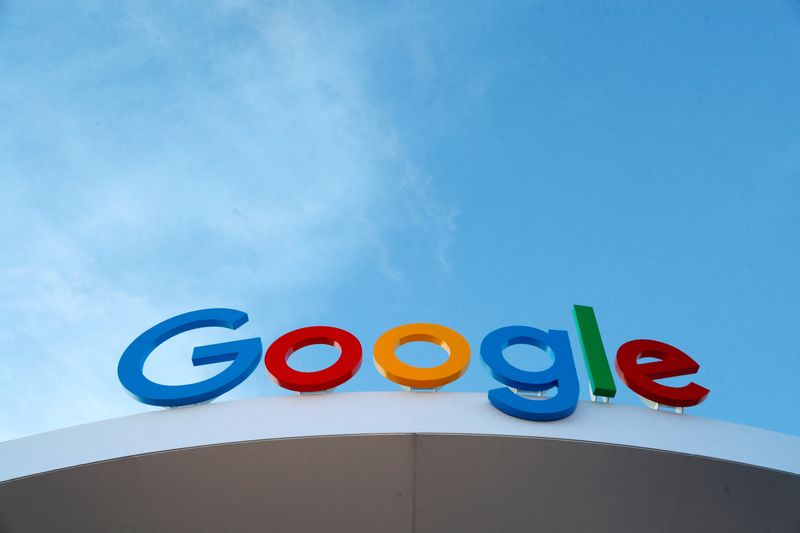Reaction to US judge ruling that Google holds illegal monopolies in ad tech

SAN FRANCISCO (Reuters) – Alphabet’s Google illegally dominates two markets for online advertising technology, a judge ruled on Thursday, dealing another blow to the tech giant and paving the way for U.S. antitrust prosecutors to seek a breakup of its advertising products.
The decision clears the way for a hearing at another trial to determine what Google must do to restore competition, such as sell off parts of its business. That trial has yet to be scheduled.
LEONIE BRINKEMA, U.S. DISTRICT JUDGE FOR THE EASTERN DISTRICT OF VIRGINIA, IN ALEXANDRIA
“In addition to depriving rivals of the ability to compete, this exclusionary conduct substantially harmed Google’s publisher customers, the competitive process, and, ultimately, consumers of information on the open web.”
GIL LURIA, ANALYST AT D.A. DAVIDSON
“The U.S. Department of Justice is focused on breaking up all of Google’s monopolies and it does not look like they are going to let up. The best course of action would be for Google to proactively spin off some of its businesses in order to address the DOJ’s concerns. That may include the ad network business, Chrome and Android. We believe a breakup of Google would create a significant amount of shareholder value, as the sum of the value of their individual businesses is far greater than where the stock is trading now.”
MICHAEL ASHLEY SCHULMAN, CHIEF INVESTMENT OFFICER AT RUNNING POINT CAPITAL
“While Google’s advertising business has long been a pillar of its financial strength, this ruling threatens to dismantle its integrated control over digital advertising, forcing either operational changes or outright divestitures. The risk of a forced breakup — once viewed as remote — is now materially higher, placing significant pressure on Google’s long-term margins and growth outlook. Investors will have to recalibrate their assumptions around Google’s advertising dominance, likely leading to greater earnings fog and a valuation reset.”
“The ruling against Google marks a watershed moment for Big Tech regulation. It raises real risks of a breakup of Google’s ad business and signals that U.S. courts are now open to structural remedies, not just fines. Investors should expect higher regulatory risk premiums across the tech sector, putting pressure on valuations just as fundamentals are already weakening.”
“A federal judge’s finding that Google illegally monopolized the ad tech market is a major inflection point for the company and the broader tech sector especially since the Trump administration was expected to be FTC-light when compared to the Biden administration.”
EVELYN MITCHELL-WOLF, ANALYST AT EMARKETER
“This decision has profound implications for the advertising industry. The open web is so deeply rooted in Google’s advertising technology that any change to the status quo could crush vulnerable publishers, who are already facing existential crises monetizing waning traffic amid consumer data restrictions.”
“The extent of the fallout will depend on the legal remedies employed, and the implementation timeline is likely to span years if Google loses its anticipated appeals. But the bigger picture is crystal clear: the antitrust tides have turned against Google and other digital advertising giants. If Meta loses its battle with the Federal Trade Commission, the digital advertising landscape could be unrecognizable in 5 years’ time.”
SARAH KAY WILEY, POLICY DIRECTOR OF NONPROFIT AD WATCHDOG CHECK MY ADS
“For years, we’ve witnessed how Google’s unchecked power has distorted the ad tech ecosystem, disadvantaging publishers, advertisers, and ultimately, consumers. Today, we are one monumental step closer to a fair and competitive digital advertising market.”
LEE HEPNER, SENIOR LEGAL COUNSEL OF AMERICAN ECONOMIC LIBERTIES PROJECT
“Case by case, antitrust enforcers are taming the beasts of Big Tech.”
“Yet another monumental win in the history of antitrust enforcement, this case in particular is a win for journalists, publishers, online content creators and the distributed open web.”
SACHA HAWORTH, EXECUTIVE DIRECTOR OF TECH OVERSIGHT PROJECT
“For years, Google wielded unchecked monopoly power over the digital advertising market – using it to suffocate the media industry and force middleman taxes on everything we buy online. The result is that our internet is less open and free, and civic discourse has irreparably been damaged by killing the local news we need to operate a vibrant democracy. This ruling is an unequivocal win for the American people that will help lower prices, increase competition, and lead to a better internet for everyone.”
(Reporting by Zaheer Kachwala in Bengaluru and Jody Godoy in Washington; Compiled by Sayantani Ghosh and Richard Chang)









